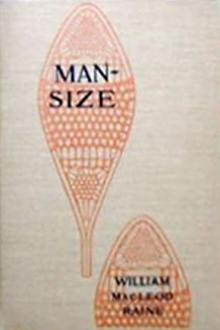Laughing Bill Hyde and Other Stories by Rex Beach (ebook smartphone .TXT) 📗

- Author: Rex Beach
Book online «Laughing Bill Hyde and Other Stories by Rex Beach (ebook smartphone .TXT) 📗». Author Rex Beach
"I had. I wrote it that way. My dreams, also, came true."
"But why?" A faint flush stole into her cheeks. "There are so many women who could have played the part better than I. You had courage to risk your piece in my hands, Mr. Phillips."
"Perhaps I knew you better than you knew yourself." She searched his face with startled curiosity. "Or better at least than the world knew you. Tell me, there is something wrong? I'm afraid he—resents your—"
"Oh no, no!" she denied, hastily, letting her eyes fall, but not before he had seen them fill again with that same expression of pain and bewilderment. "He's—not himself, that's all. I—You—won't irritate him? Please! He has such a temper."
Francis came out of the shadows scowling. "Well, let's get at it," said he.
Phillips agreed. "If you don't mind we'll start with your entrance. I wish you would try to express more depth of feeling, more tenderness, if you please, Mr. Francis. Remember, John Danton has fought this love of his for many years, undertaking to remain loyal to his wife. He doesn't dream that Diane returns his love, for he has never spoken, never even hinted of his feelings until this instant. Now, however, they are forced into expression. He begins reluctantly, frightened at the thing which makes him speak, then when she responds the dam breaks and his love over-rides his will power, his loyalty, his lifelong principles; it sweeps him onward and it takes her with him. The truth appals them both. They recognize its certain consequences and yet they respond freely, fiercely. You can't overplay the scene, Mr. Francis."
"Certainly I can overplay it," the star declared. "That's the danger.
My effects should come from repression."
"I must differ with you. Repressive methods are out of place here. You see, John Danton loses control of himself—"
"Nonsense!" Francis declared, angrily.
"The effectiveness of the scene depends altogether upon its—well, its savagery. It must sweep the audience off its feet in order that the climax shall appear logical."
"Nonsense again! I'm not an old-school actor, and I can't chew scenery. I've gained my reputation by repressive acting, by intensity."
"This is not acting; this is real life."
Francis's voice rose a tone in pitch, and his eyes flashed at this stubborn resistance to his own set ideas.
"Great heavens, Phillips! Don't try to tell me my own business.
People don't behave that way in real life; they don't explode under
passion—not even jealousy or revenge; they are reserved. Reserve!
That's the real thing; the other is all make-believe."
Seeing that it was useless to argue with the man, Phillips said nothing more, so Francis and his wife assumed their positions and began their lines.
It was a long scene and one demanding great force to sustain. It was this, in fact, which had led to the choice of Irving Francis for the principal rôle, for he was a man of tremendous physical power. He had great ability, moreover, and yet never, even at rehearsals, had he been able to invest this particular scene with conviction. Phillips had rehearsed him in it time and again, but he seemed strangely incapable of rising to the necessary heights. He was hollow, artificial; his tricks and mannerisms showed through like familiar trade marks. Strangely enough, the girl also had failed to get the most out of the scene, and this morning, both star and leading woman seemed particularly cold and unresponsive. They lacked the spark, the uplifting intensity, which was essential, therefore, in desperation, Phillips finally tried the expedient of altering their "business," of changing positions, postures, and crosses; but they went through the scene for a second time as mechanically as before.
Knowing every line as he did, feeling every heart throb, living and suffering as John Danton was supposed to be living and suffering, Phillips was nearly distracted. To him this was a wanton butchery of his finest work. He interrupted, at last, in a heart-sick, hopeless tone which sorely offended the already irritated Francis.
"I'm—afraid it's no use. You don't seem to get it."
"What is it I don't get?" roughly demanded the actor.
"You're not genuine—either of you. You don't seem to feel it."
"Humph! We're married!" said the star, so brutally that his wife flushed painfully. "I tell you I get all it's possible to get out of the scene. You wrote it and you see a lot of imaginary values; but they're not there. I'm no superman—no god! I can't give you more than the part contains."
"Look at it in this light," Phillips argued, after a pause. "Diane is a married woman; she, too, is fighting a battle; she is restrained by every convention, every sense of right, every instinct of wifehood and womanhood. Now, then, you must sweep all that aside; your own fire must set her ablaze despite—"
"I? I must do all this?" mocked the other, furiously. "Why must I do it all? Make Norma play up to me. She underplays me all the time; she's not in my key. That's what's the matter—and I'm damned tired of this everlasting criticism."
There was a strained silence, during which the two men faced each other threateningly, and a panic seized the woman.
She managed to say, uncertainly: "Perhaps I—should play up to you,
Irving."
"On the contrary, I don't think the fault is yours," Phillips said, stiffly.
Again there was a dramatic silence, in which there was no element of the make-believe. It was the clash of two strong men who disliked each other intensely and whose masks were slipping. Neither they nor the leading woman detected a figure stealing out from the gloom, as if drawn by the magnetism of their anger.
"My fault, as usual," Francis sneered. "Understand this, Phillips, my reputation means something to me, and I won't be forced out of a good engagement by a—well, by you or by any other stage manager."
Phillips saw that same fearful look leap into the woman's eyes, and it checked his heated retort. "I don't mean to find fault with you," he declared, evenly. "I have the greatest respect for your ability as an actor, but—"
The star tossed his massive head in a peculiarly aggravating manner.
"Perhaps you think you can play the part better than I?"
"Irving! Please!" breathed his wife.
"Show me how it should be done, if you feel it so strongly."
"Thank you, I will," Phillips answered, impulsively. "I'm not an actor, but I wrote this piece. What's more, I lived it before I wrote it. It's my own story, and I think I know how it should be played."
Francis smiled mockingly. "Good!" said he; "I shall learn something."
"Do you mind?" The author turned to the real Diane, and she shook her head, saying, uncertainly:
"It's—very good of you."
"Very well. If you will hold the manuscript, Mr. Francis, I'll try to show what I feel the scene lacks. However, I don't think I'll need any prompting. Now, then, we'll begin at John Danton's entrance."
With the mocking smile still upon his lips, Francis took the manuscript and seated himself upon the prompter's table.
It was by no means remarkable that Henry Phillips should know something about acting, for he had long been a stage manager, and in emergencies he has assumed a good many divergent rôles. He felt no self-consciousness, therefore, as he exchanged places with Francis; only an intense desire to prove his contentions. He nerved himself to an unusual effort, but before he had played more than a few moments he forgot the hostile husband and began to live the part of John Danton as he had lived it in the writing, as he invariably lived it every time he read the play or saw it acted.
Nor, as he had said, did he need prompting, for the lines were not the written speeches of another which had been impressed upon his brain by the mechanical process of repetition; they were his own thoughts expressed in the simplest terms he knew, and they came forth unbidden, hot, eager. Once he began to voice them he was seized by that same mighty current which had drawn them from him in the first place and left them strewn upon paper like driftwood after a flood. He had acted every part of his play; he had spoken every line many times in solitude; but this was the first time he had faced the real Diane. He found himself mastered by a fierce exultation; he forgot that he was acting or that the woman opposite him was playing a rôle of his creation; he began to live his true life for the first time since he had met the wife of Irving Francis. Clothed in the make-believe, the real Henry Phillips spoke freely, feelingly. His very voice changed in timbre, in quality; it became rich, alive; his eyes caressed the woman and stirred her to a new response.
As for Irving Francis, he watched the transformation with astonishment. Grudgingly, resentfully, he acknowledged that this was indeed fine acting. He realized, too, that his blind egotism had served merely to prove the truth of the author's criticism and to emphasize his own shortcomings. The idea enraged him, but the spectacle held him enthralled.
Norma Berwynd was not slow to appreciate the truth. Accustomed thoroughly to every phase of the make-believe world in which she dwelt, she recognized unerringly in the new John Danton's words and actions something entirely unreal and apart from the theatrical. The conviction that Henry Phillips was not acting came to her with a blinding suddenness, and it threw her into momentary confusion, hence her responses were mechanical. But soon, without effort on her part, this embarrassment fell away and she in turn began to blaze. The flame grew as Phillips breathed upon it. She realized wildly that her heart had always hungered for words like these, and that, coming from his lips, they carried an altogether new and wondrous meaning; that they filled some long-felt, aching want of which she had been ignorant until this moment. The certainty that it was Phillips himself who spoke, and not a mere character of his creation, filled her with an exultant recklessness. She forgot her surroundings, her husband's presence, even the fact that the lines she spoke were not of her own making.
Never had the scene been played like this. It grew vital, it took on a tremendous significance. No one could have observed it and remained unresponsive. Francis let fall the manuscript and stared at the actors wonderingly. Since he was an actor, nothing was so real to him, nothing so thrilling, as the make-believe. He realized that this was indeed a magnificent exhibition of the artificial. With parted lips and pulse athrob he followed the wooing of that imaginary John Danton, in whom he could see no one but himself.
After a time he became conscious of a presence at his side, and heard some one breathing heavily. Turning with a start, he found Léontine Phillips at his shoulder. She, too, was aroused, but in her sneering visage was that which brought the actor abruptly out of his spell. She had emerged from the shadows noiselessly, and was leaning forward, her strong hands gripping the edge of the table littered with its many properties.
Mrs. Phillips had played emotional scenes herself, but never with such melodramatic intensity as she now unconsciously displayed. Her whole body shook as with an ague, her dark face was alive with a jealous fury which told Irving Francis the story he had been too dull to suspect. The truth, when it came home, smote him like a blow; his hatred for the author, which had been momentarily forgotten—momentarily lost in his admiration of the artist—rose up anew, and he recognized this occult spell which had held him breathless as the thrall of a vital reality, not, after all, the result of inspired acting. Instantly he saw past the make-believe, into the real, and what he saw caused him to utter a smothered cry.
Léontine turned her face to him. "You fool!" she whispered through livid lips.
Francis was a huge, leonine man; he rose now to his full height, as a cat rises. But the drama drew his gaze in spite of himself; he could not keep his eyes from his wife's face. Léontine plucked at his sleeve and whispered again:
"You fool!"
Something contorted the actor's frame bitterly, and he gasped like a man throttled.





Comments (0)